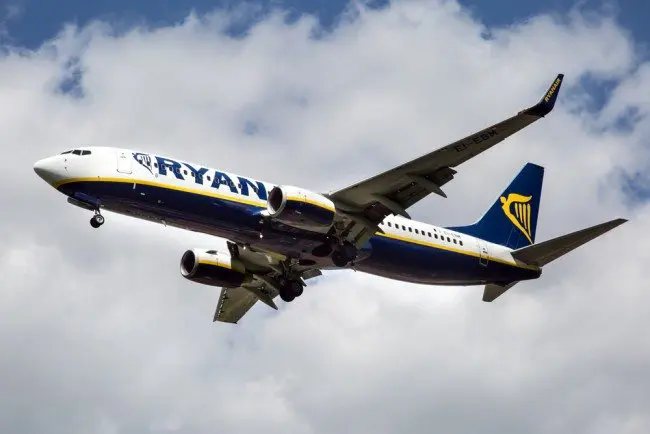Average fares dropped 17 per cent, and profits slid 8 per cent to 95m euros, £82m, as the fall in the pound also hit its results, the BBC reports.
However, passenger numbers in the quarter rose 16 per cent to 29 million, and its planes flew at 95 per cent capacity.
Ryanair said it was “cautious” about the rest of the financial year, but profits would still meet expectations.
Ryanair’s average fares were 33 euros, £28, per passenger in the October-to-December period, the third quarter of its financial year.
It said it was increasing capacity and adding new routes and bases at a time when other airlines were also adding capacity, and “accordingly the price environment remains weak”.
Ryanair added that uncertainty following the Brexit vote, weaker sterling and the switch of charter capacity from Turkey, Egypt and North Africa into Spain and Portugal, would “continue to put downward pressure on pricing for the remainder of this year” and next.
It expects yields, or average fare per passenger per mile, in the fourth quarter to be down by 15 per cent.
However, it said it was “maintaining its full-year profit guidance in the range of 1.30bn to 1.35bn euros”.
In the next financial year it said it seemed clear that “pricing will continue to be challenging and we will respond to these adverse market conditions with strong traffic growth and lower unit costs”.
“There’s a huge amount of capacity which has migrated out of North Africa into the likes of Portugal and Spain,” Ryanair chief financial officer Neil Sorahan told the BBC.
“That said, Ryanair is very focused on our costs and you would have seen in the quarter our unit costs, excluding fuel, were down 6 per cent at a time when our competitors are actually seeing their costs rise.
“It’s the reason we’re making the kind of profits that we made… and why we’re retaining our [profit] guidance.”
‘Great opportunities’
Asked about the carrier’s plans post-Brexit, Mr Sorahan said that while the airline expected to expand in the UK, “we have been quite clear that as we move closer to Brexit… that we won’t grow as quickly in the UK as we might otherwise have done”.
“We have 15 per cent market share now all across Europe so there’s an awful lot more to play for and we’re seeing a lot of great opportunities outside of the UK,” he added.
Neil Wilson, senior market analyst at ETX Capital, said: “Ryanair’s trouble is that it has huge exposure to the UK market and sterling, but earnings are booked in euros.
“The airline derives about a quarter of its earnings in pounds so the collapse in sterling explains a good deal of the fall in profits,” he added.
“The company’s response to the drop in the pound – to aggressively lower fares to grab market share while expanding routes – doesn’t help profits in the near term.
“But going forward the growth in traffic will help put it on a surer footing, particularly as it’s also reducing costs.”


